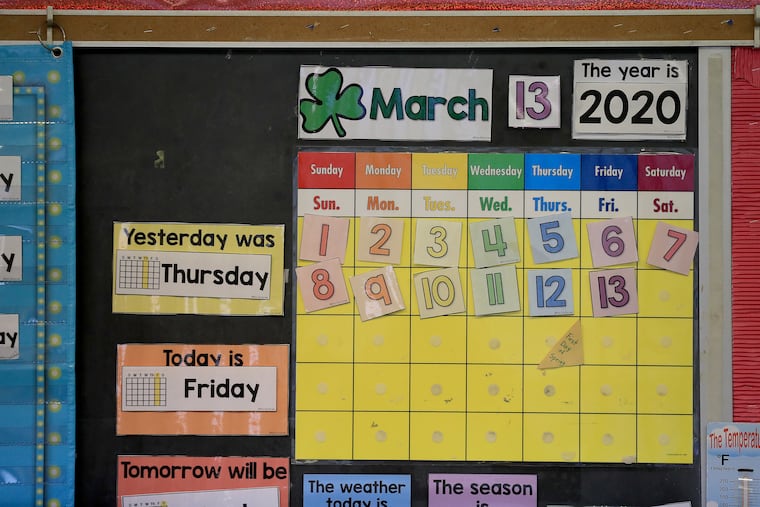‘This is why I hate school’: Philly students are right about rushed reopening | Opinion
If you’ve struggled to follow the latest reopening plans for Philly schools, so have we — and we’re both teachers.

If you’ve struggled to follow the latest reopening plans of the School District of Philadelphia, so have we — and we’re both teachers. Here’s the short version: families with students in grades K-5 had the opportunity to enroll in hybrid learning this spring. Only a small minority have opted in. Meanwhile, families of students in grades 6-9 and students with complex needs in grades 10-12 currently have the opportunity to opt into hybrid learning for a May 10 start date to “Hybrid Learning, Phase III.”
Last week, the district handed educators the complicated task of informing students and families of the radical schedule changes needed to prepare for this “transition.” Students will have had just three normally scheduled school days in a 15 school day span (the other 12 days suddenly became either half days of live classes or a completely “asynchronous” day for secondary students across the city). When asked why, we struggled to provide them with a thoughtful explanation.
» READ MORE: Philly schools committing $80m in classroom resources in new budget picture
“This is why I hate school,” wrote one eighth-grade student in the Google Meet chat box regarding this continued confusion and apparent senselessness. “I don’t care anymore. I just want it to be over,” typed an 11th grader into the chat, followed by “^^,” “x2,” and “***” from peers to signal agreement. This is their shorthand for defeat. There is little outrage from our students anymore. After months of this treatment — and arguably years of neglect — these children expect chaos and disappointment. Of all the missteps of School District leadership in the midst of this ongoing pandemic, the lack of transparency and due respect toward families have been perhaps the most damning.
The hypocrisy of bringing students back to buildings due to “learning loss,” only to cut in half more than two weeks of live learning time, also sparks concern. This monumental shift in the final quarter of the school year will only yield 10 in-person days for the few students who return. Middle school students may spend more of that time taking PSSAs than actually learning. Teachers will attempt the unthinkable: teaching a handful of spread out, in-person students while simultaneously instructing dozens of virtual students through a computer, all while masked.
» READ MORE: Schools open: Camden’s youngest students begin first day of in-person classes
The COVID-19 vaccine rollout has protected many educators, like ourselves, and for that, we feel grateful. Yet, we worry about our students, their families, and their communities who remain vulnerable. Adding to fears, Michael Osterholm, of President Joe Biden’s COVID-19 Task Force, has questioned the rush to return students to schools when variants such as B117 have proven more infectious among children than the original strain. So, despite vaccine rates being high in states like Michigan, outbreaks have continued — and schools there have become a common spot for outbreaks.
As a result, local district leaders must increase transparency around COVID-19 outbreaks in schools, like the March outbreak at Mayfair. The COVID-19 Dashboard released in recent weeks is encouraging, but its methods remain unclear, and it’s not accessible in all primary home languages.
Rationale and evidence behind decisions like how rooms are cleared for occupancy and which rooms get air purifiers should be published. Why, for example, would district leaders suddenly insist that a room with “Maximum Zero Occupancy” means one teacher can still teach remotely in it, illogically asserting that zero equals one? Further, necessary equipment like purifiers must be maintained and replaced with fidelity and transparency.
» READ MORE: Philly schools to bring more students back to classrooms
Lastly, the district must make serious considerations around the need for continued digital/hybrid learning in the fall now, and not later in the summer when families and school staff have little time to prepare. To this end, we call on Comcast and the district to expand offerings for free and legitimately high-speed internet connections for all School District families.
After breaking trust countless times, the School District of Philadelphia doesn’t get the luxury and privilege of additional trust. We remember the empty promises last March about hand sanitizer. We remember the asbestos the district still hasn’t cleared from dozens of schools even after years of public pressure. To district leaders, as you demand of principals and teachers scraping by with shoestring resources, and of our students on countless standardized tests: please do show your work.
Abigail Kennedy is an ESOL teacher at South Philadelphia High School and previously taught for Penn State University Park and Penn State Abington. John Stuetz is a Lindback Award-winning ESOL teacher and political liaison at Mayfair School.